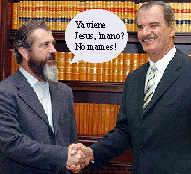Mel, the Maya, and a teaching moment to be squandered
 Mel Gibson's new movie is about the collapse of the post-classic Maya.
Mel Gibson's new movie is about the collapse of the post-classic Maya. You should be rubbing your eyes and re-reading this several times.
Now, I could easily pull the "responsible anthropologist" card and quibble propter hoc about the inaccuracies that have already come to light: it was shot in an anachronistic Yucatec; it pushes large-scale human sacrifice rather than self-mutilation; it features the Aztec sun stone as the official website's motif. Or I could be like every other smartass blogger and chortle at our auteur's face-fur.
I would rather get speculative--on very little evidence, admittedly--as to Gibson's artistic intentions. He could tell any variety of tale he chose to at this point. Why a society's collapse? Is there some larger domestic or global purpose than simply putting out a rousing bit of exotica?
For that matter, why stop at nearly complete ethnographic accuracy? Take some of that "Passion" paycheck and get that aging whiz-kid linguist who's cracking the Maya glyphs to do you up something synthetic like the "Stargate" team got from their Egyptologist (even though he was guessing at vowel sounds)?
Speaking of speculation: does this mean there is gonna be a sequel in 2012 when all the calendrical caca is supposed to hit the metaphysical fan? Or is that too New Age-y and heretical? Like Mel is worried about heresy, drawing on that batty nun's visions...
(Even if so, that would only be the end of a 144,000-day baktun, and I think that number is only special to self-satisfied neo-Calvinists anyway.)
When this flick comes out, it's a chance for anthropologists to begin to get back to where Mead and Montague and Krober had us in the public consciousness. Not with tossing cold water on a piece of entertainment just because we can. Not by confining our educative efforts to offhand deprecations in our classrooms.
Rather, we have to find a patch of the media spotlight the movie draws and get noticed. Argue that the story we're developing about the Maya, and about all humans--comprehensive, contextualized, factually grounded--beats the hell out of even good entertainment. Because that story isn't just absorbing (which more nonexperts would discover if we would just gang up and kick goddamn Jared Diamond out of our turf). It has the added benefit of actually helping us understand us. There ain't much bigger than that, and what there is we can also probably speak about.
Sure, the Maya have been so useful and profitable as a "mystery" that it's tempting to play that aspect up. (P.S. They didn't disappear, ya numbnuts; they're still living in the same area, just as prickly as ever. It was that particular manner of organizing themselves that disappeared.) But they are probably more useful and definitely more relevant when considered as fully figured humans making and (tragically) unmaking their world in ways we're still uncovering. That's neither prosaic nor boring, nor is it any less engrossing or relevant for being demystified.
With these kinds of insights, anthropology just might help save us--and not in the way Mel might hope.


0 Comments:
Post a Comment
<< Home